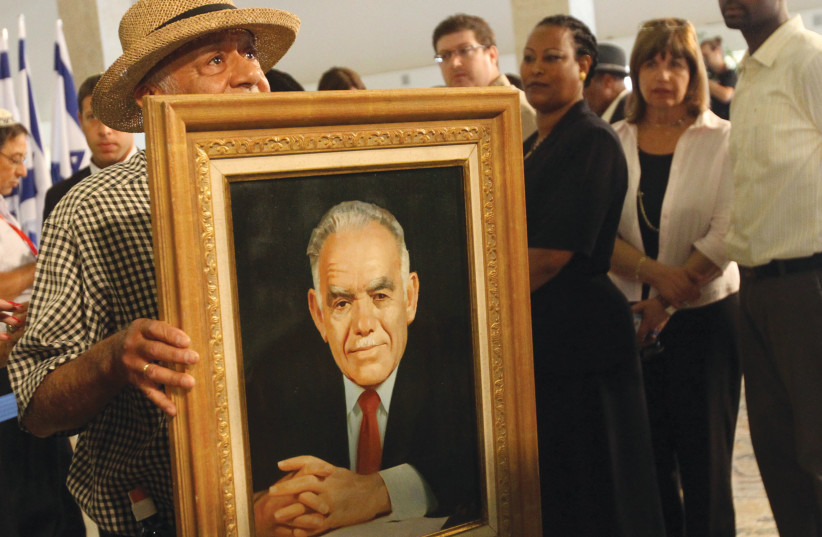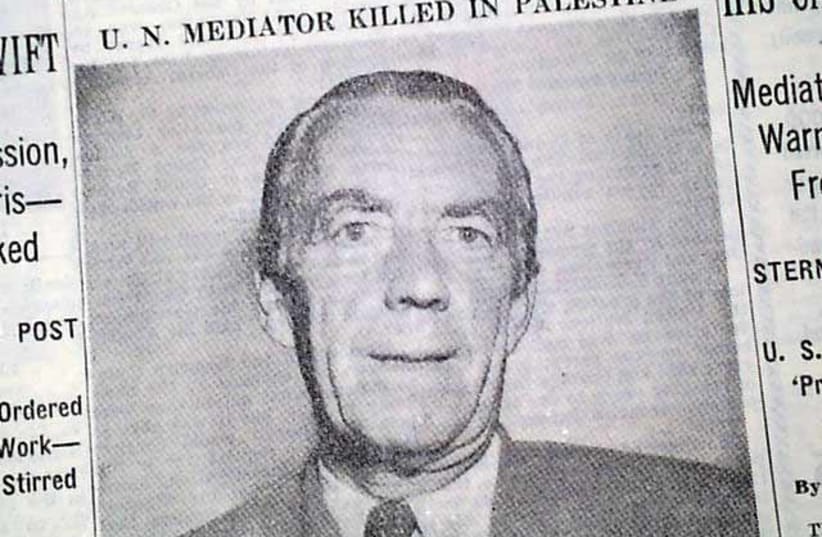September 17, 2021 marks 73 years since the assassination of Count Folke Bernadotte, a Swedish diplomat who had worked as a mediator between Jews and Arabs, by the pre-state militia known as the Stern Gang (Lehi).
Bernadotte was a member of the Swedish royal family and had worked extensively as a diplomat during World War II. During this time, he had helped free tens of thousands of prisoners held in Nazi Germany and had worked unsuccessfully to negotiate an armistice between the Nazis and the Western Allies, notably without the knowledge of Adolf Hitler.
In May 1948, the UN Security Council appointed Bernadotte the United Nations mediator in Palestine in an attempt to negotiate an end to the violence between Jews and Arabs following the war that broke out right after Israel declared independence.
Bernadotte worked extensively to try and mediate during the war, and had even helped mediate an initial truce in the conflict. However, he is most well-remembered for his plan, known as the "Bernadotte plan," which he wrote in the summer and submitted to the UN General Assembly on September 16, 1948.
The first draft of the plan, submitted in the summer, called for the establishment of a union between Mandatory Palestine and Transjordan with two member-states, one Arab and one Jewish, with autonomy over foreign relations and fixed boundaries regarding the status and sovereignty of notable cities and territories belonging to the Jewish and Arab state.
The second and far more complex draft recognized the existence of Israel (the wording specifically noting that "A Jewish State called Israel exists in Palestine and there are no sound reasons for assuming that it will not continue to do so").
Of note regarding the second plan were the territorial considerations and the right of return. In terms of territory, the proposal specifically stated that the Negev would be Arab territory while the Galilee would be Jewish. Haifa would be declared a free port and the airport at Lydda (known today as Lod and the airport now known as Ben-Gurion Airport) be a free airport. Jerusalem would essentially be an international city under the control of the UN.
In terms of the right of return, Bernadotte was very vocal in his support for an Arab right of return, and said they should be allowed to return to their homes in Jewish-controlled territory at the earliest date possible, and those who do not return should be repatriated, resettled and financially compensated.
"The exodus of Palestinian Arabs resulted from panic created by fighting in their communities, by rumors concerning real or alleged acts of terrorism, or expulsion," he said in the proposal. "It would be an offense against the principles of elemental justice if these innocent victims of the conflict were denied the right to return to their homes while Jewish immigrants flow into Palestine, and, indeed, at least offer the threat of permanent replacement of the Arab refugees who have been rooted in the land for centuries."
The plan would ultimately be rejected by the UN, many crediting the lack of support from then-US president Harry S. Truman. In addition, Israel's leadership had also decided to reject the plan.
But one day after his plan was submitted to the General Assembly, Bernadotte would be killed.
His was planned by the Stern Gang during a truce period between Israel and the Arab states. The Stern Gang was unaware Israel rejected the plan, and feared they might actually agree to it.


The assassination was approved by Stern Gang leaders, including future Israeli prime minister Yitzhak Shamir and future MK and peace activist Natan Yellin-Mor, and was carried out on the 17th in the Katamon neighborhood in Jerusalem. A four-man team ambushed his motorcade, with one of the men firing six rounds into Bernadotte, and another 18 at Col. Andre Serot, who sat next to him, killing them.
According to Gen. Aage Lundstrom, who was in the motorcade, the scene took place as follows:
"In the Katamon quarter, we were held up by a Jewish Army-type jeep placed in a roadblock and filled with men in Jewish Army uniforms. At the same moment, I saw an armed man coming from this jeep. I took little notice of this because I merely thought it was another checkpoint. However, he put a Tommy gun through the open window on my side of the car, and fired point-blank at Count Bernadotte and Col. Serot. I also heard shots fired from other points, and there was considerable confusion... Colonel Serot fell in the seat in back of me, and I saw at once that he was dead. Count Bernadotte bent forward, and I thought at the time he was trying to get cover. I asked him: 'Are you wounded?' He nodded, and fell back.... When we arrived [at Hadassah hospital]... I carried the Count inside and laid him on the bed.... I took off the Count's jacket and tore away his shirt and undervest. I saw that he was wounded around the heart and that there was also a considerable quantity of blood on his clothes about it. When the doctor arrived, I asked if anything could be done, but he replied that it was too late."
The Stern Gang later admitted responsibility for the incident, and the organization was disarmed and many members arrested, but no one was charged with the assassination itself.
No public admission of the Stern Gang's role in the assassination was made until 1977, six years after the statute of limitations expired. The gun used to kill Bernadotte was only discovered in 2018 in an inventory check at the Israel Police Heritage House, as noted by Makor Rishon.
The murder had a diplomatic fallout with Sweden, who had been highly critical of Israel's investigation into the assassination. However, Israel has made some gestures in the aftermath, notably the creation of the Bernadotte forest.
His legacy today lives on with many striving to achieve peace between Israel and the Arab world, especially the Palestinians, and his ultimate quest to achieve an armistice in the war was succeeded by his deputy, Ralph Bunche, in 1949, netting him the Nobel Peace Prize.


He also is considered as having laid the groundwork for the foundation of the United Nations Relief Works Agency for Palestinian Refugees in the Near East (UNRWA).
"Many of the underlying assumptions of specific UNRWA interventions – particularly our rights-based protection work – find their first expression in Count Bernadotte’s early reporting to United Nations headquarters," then-UNRWA spokesperson Chis Gunness said in 2013.
"The links we make today between satisfying humanitarian need and creating an environment in which peace can take hold, were first given voice by him. And in UNRWA’s repeated calls for a just and durable solution for the refugees – a voice sadly crying in the wilderness – we hearken back to Count Bernadotte who annunciated this truth that dare not speak its name with such boldness, a boldness that may, ultimately, have cost him his life."
Bernadotte did not just represent an attempt at stopping the violence between Jews and Arabs, though. He also represented the United Nations as the body's first attempt at mediating and attempting to solve a major conflict. Today, the UN has had many peacekeeping and mediation efforts all over the world, and highlights the body's efforts to make peace and mitigate conflicts, as opposed to the failures of its predecessor, the League of Nations.
According to Sven Erik Soder – the director-general of the Folke Bernadotte Academy, a Swedish government agency that works on peace, security and human rights issues – Bernadotte was the father of shuttle diplomacy and peace missions, and was certain that his integrity and humanitarian values had led to the adoption of the Fourth Geneva Convention (the Protection of Civilian Persons in Time of War).
Greer Fay Cashman contributed to this report.
